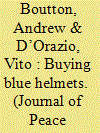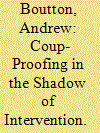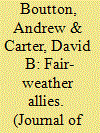|
|
|
Sort Order |
|
|
|
Items / Page
|
|
|
|
|
|
|
| Srl | Item |
| 1 |
ID:
173890


|
|
|
|
|
| Summary/Abstract |
While the evolving nature and proliferation of UN peacekeeping operations in the post-Cold War period is well documented, we know less about how personnel are recruited for these missions. Furthermore, recent developments have rendered existing supply-side explanations for troop contributions less convincing. The increasing demand for personnel, along with stagnant UN reimbursement rates and the rising costs of participation that began during the 1990s, mean that it is less attractive than ever for developing countries to offer their own troops to what have become increasingly ambitious operations. Yet, we see a large pool of developing countries continuing to do so. To address this puzzle, we argue that UN member states with strong preferences for establishing peacekeeping missions have begun using foreign aid as an inducement to help potential contributors overcome the collective action problem inherent in multilateral peacekeeping operations. We uncover strong empirical evidence that these ‘pivotal states’ strategically allocate foreign aid to persuade contributing states to boost their contributions, and also to ensure that these missions continue to be staffed and maintained as costs rise, particularly during the post-1999 period. We also find that states are responsive to these financial inducements: foreign aid increases both the likelihood of contributing personnel and the size of a state’s contribution. Theoretically, this article advances the scholarly understanding of international organizations and cooperation by illuminating an informal, extra-organizational strategy by which IOs can facilitate cooperation.
|
|
|
|
|
|
|
|
|
|
|
|
|
|
|
|
| 2 |
ID:
165433


|
|
|
|
|
| Summary/Abstract |
How does the anticipation of external support affect dictators’ domestic political behavior? We lack a convincing explanation for why authoritarian leaders often attempt to consolidate power in ways that heighten the risk of violence and endanger the regime. Adapting the moral hazard framework from the alliance literature, I argue that the anticipation of military support from allies lowers the potential costs of regime purges. This reduces the incentives for dictators to govern inclusively, encouraging more aggressive coup-proofing actions and generating a higher risk of retaliatory violence. Using new data on elite purges in authoritarian regimes, I find that defensive alliances increase the propensity of dictators to aggressively consolidate power. In addition, these types of alliances lead to purges of more powerful elites, which, in turn, increase the likelihood of post-purge large-scale violence. By contrast, forms of external support that entail less commitment by the patron do not have these effects. I provide an overview of the origins of the 1998–1999 civil war in Guinea-Bissau to complement the novel empirical results and to illustrate the causal logic of the argument in the context of West African alliance politics.
|
|
|
|
|
|
|
|
|
|
|
|
|
|
|
|
| 3 |
ID:
134933


|
|
|
|
|
| Summary/Abstract |
While it is commonly assumed that the United States uses foreign aid as an instrument to combat global terrorism, it is unclear whether it views terrorist threats to other countries, particularly its allies, with urgency. We show that the relationship between transnational terrorism and foreign aid flows is strongly conditional on whether terrorist activity based in a potential recipient directly threatens the United States. Using data on terrorist attacks and casualties in potential recipient countries, we demonstrate that terrorist activity based within a state’s borders, which targets US interests is a strong determinant of both whether that state receives any aid and also how much aid it receives. In contrast, the presence of terrorism targeted at non-US interests, even if it targets formal allies of the United States, is generally unrelated to US aid allocation. These findings suggest that the United States' use of foreign aid to fight terrorism and political violence is narrowly tailored to assist countries that directly threaten its own security, rather than those of other countries, even its allies.
|
|
|
|
|
|
|
|
|
|
|
|
|
|
|
|
| 4 |
ID:
134453


|
|
|
|
|
| Summary/Abstract |
A common strategy pursued by states targeted by international terrorism is to provide economic and military assistance to the states that host this activity. This is thought to increase their willingness and capacity to crack down on terrorism, but very little work to date has looked at whether this strategy actually leads to desirable outcomes. This article offers an explanation for why a strategy of foreign aid-for-counterterrorism can be successful in some contexts, but counterproductive in situations in which recipients have more pressing strategic priorities. Specifically, I argue that host states receiving US foreign aid that are involved in an ongoing interstate rivalry will use the aid to arm against their rival, rather than to undertake counterterrorism. These states thus have an incentive not to disarm terrorist groups, but rather to play-up the threat from terrorism in order to continue receiving aid concessions. Using data on US foreign aid and terrorist activity in recipient countries, I employ a series of duration and count models to demonstrate that, while US foreign aid can help to decrease terrorist activity in non-rivalrous states, the opposite is true in states with at least one rival.
|
|
|
|
|
|
|
|
|
|
|
|
|
|
|
|
|
|
|
|
|